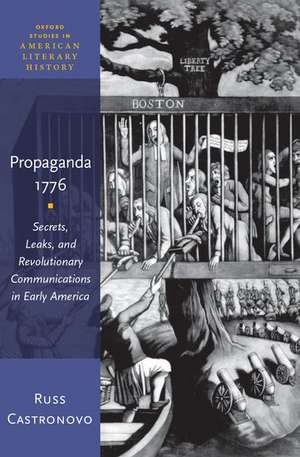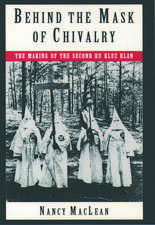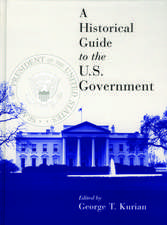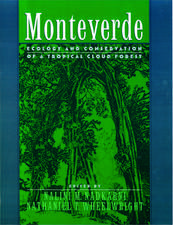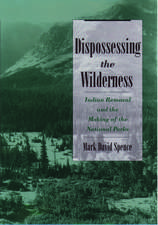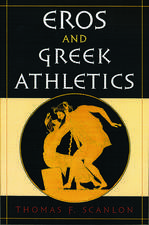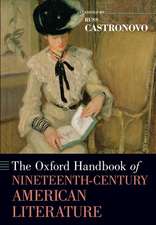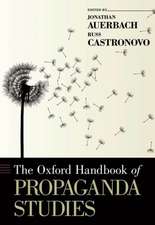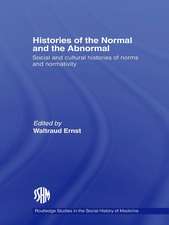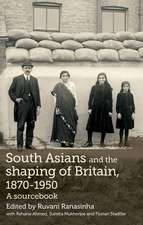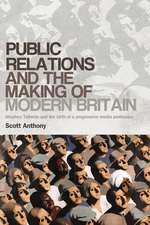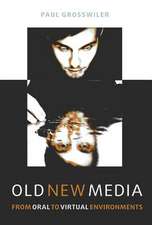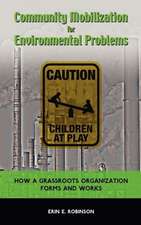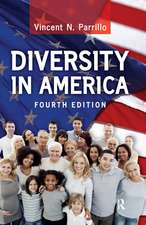Propaganda 1776: Secrets, Leaks, and Revolutionary Communications in Early America: Oxford Studies in American Literary History
Autor Russ Castronovoen Limba Engleză Hardback – 25 sep 2014
| Toate formatele și edițiile | Preț | Express |
|---|---|---|
| Paperback (1) | 177.25 lei 31-38 zile | |
| Oxford University Press – 17 ian 2019 | 177.25 lei 31-38 zile | |
| Hardback (1) | 341.40 lei 31-38 zile | |
| Oxford University Press – 25 sep 2014 | 341.40 lei 31-38 zile |
Din seria Oxford Studies in American Literary History
- 23%
 Preț: 189.55 lei
Preț: 189.55 lei - 28%
 Preț: 473.69 lei
Preț: 473.69 lei - 23%
 Preț: 190.00 lei
Preț: 190.00 lei - 17%
 Preț: 517.19 lei
Preț: 517.19 lei - 8%
 Preț: 249.20 lei
Preț: 249.20 lei - 11%
 Preț: 160.44 lei
Preț: 160.44 lei - 25%
 Preț: 547.76 lei
Preț: 547.76 lei - 15%
 Preț: 245.91 lei
Preț: 245.91 lei - 28%
 Preț: 437.67 lei
Preț: 437.67 lei - 28%
 Preț: 500.30 lei
Preț: 500.30 lei - 22%
 Preț: 485.80 lei
Preț: 485.80 lei - 25%
 Preț: 492.00 lei
Preț: 492.00 lei - 13%
 Preț: 537.39 lei
Preț: 537.39 lei - 28%
 Preț: 449.95 lei
Preț: 449.95 lei - 15%
 Preț: 478.19 lei
Preț: 478.19 lei - 28%
 Preț: 431.30 lei
Preț: 431.30 lei - 28%
 Preț: 473.16 lei
Preț: 473.16 lei - 23%
 Preț: 186.98 lei
Preț: 186.98 lei - 22%
 Preț: 486.63 lei
Preț: 486.63 lei - 24%
 Preț: 438.24 lei
Preț: 438.24 lei - 28%
 Preț: 405.91 lei
Preț: 405.91 lei - 30%
 Preț: 619.15 lei
Preț: 619.15 lei - 25%
 Preț: 494.88 lei
Preț: 494.88 lei - 28%
 Preț: 406.74 lei
Preț: 406.74 lei - 27%
 Preț: 490.86 lei
Preț: 490.86 lei - 16%
 Preț: 474.66 lei
Preț: 474.66 lei - 10%
 Preț: 162.65 lei
Preț: 162.65 lei - 17%
 Preț: 478.43 lei
Preț: 478.43 lei - 22%
 Preț: 191.32 lei
Preț: 191.32 lei - 27%
 Preț: 408.43 lei
Preț: 408.43 lei - 28%
 Preț: 487.67 lei
Preț: 487.67 lei - 12%
 Preț: 495.20 lei
Preț: 495.20 lei - 16%
 Preț: 235.21 lei
Preț: 235.21 lei - 12%
 Preț: 556.22 lei
Preț: 556.22 lei - 19%
 Preț: 517.04 lei
Preț: 517.04 lei -
 Preț: 265.81 lei
Preț: 265.81 lei - 18%
 Preț: 216.55 lei
Preț: 216.55 lei - 16%
 Preț: 177.25 lei
Preț: 177.25 lei - 12%
 Preț: 493.95 lei
Preț: 493.95 lei - 13%
 Preț: 332.46 lei
Preț: 332.46 lei - 18%
 Preț: 518.08 lei
Preț: 518.08 lei - 24%
 Preț: 475.66 lei
Preț: 475.66 lei - 30%
 Preț: 491.75 lei
Preț: 491.75 lei - 14%
 Preț: 253.16 lei
Preț: 253.16 lei - 27%
 Preț: 464.92 lei
Preț: 464.92 lei
Preț: 341.40 lei
Preț vechi: 387.45 lei
-12% Nou
Puncte Express: 512
Preț estimativ în valută:
65.33€ • 68.21$ • 54.07£
65.33€ • 68.21$ • 54.07£
Carte tipărită la comandă
Livrare economică 24-31 martie
Preluare comenzi: 021 569.72.76
Specificații
ISBN-13: 9780199354900
ISBN-10: 0199354901
Pagini: 256
Ilustrații: 12 halftones
Dimensiuni: 157 x 244 x 25 mm
Greutate: 0.48 kg
Editura: Oxford University Press
Colecția OUP USA
Seria Oxford Studies in American Literary History
Locul publicării:New York, United States
ISBN-10: 0199354901
Pagini: 256
Ilustrații: 12 halftones
Dimensiuni: 157 x 244 x 25 mm
Greutate: 0.48 kg
Editura: Oxford University Press
Colecția OUP USA
Seria Oxford Studies in American Literary History
Locul publicării:New York, United States
Recenzii
... both books have done a service to the field of early North American studies in pushing our understandings of rumor, rhetoric, and, yes, propagandistic communications forward. This fascinating field, once opened, should continue to yield new insights and prompt new methods of analysis. We owe a debt to each of these authors for his work in this area.
Writing as one of the leading scholars of American Studies today, Castronovo handles these historical and contemporary questions with verve and insight. Propaganda 1776 never shies away from raising inconvenient truths about the American Revolution.
Neo-whig historians attacked progressive historians who debunked patriot 'propaganda' by telling us that American revolutionaries were true believers, if ideological, and radical in ways we can embrace without much reservation. Too often this has devolved into another version of American exceptionalism. Russ Castronovo has another take on their political talents: he finds a creative resistance to power in the modes of dissemination as much as their message. The radicalism of the Revolution is back up for grabs in this fascinating corrective.
Castronovo deftly-even audaciously-shuttles his way back and forth across the last three centuries to uncover the democratic work of propaganda operative at the nation's founding and continuing to this day. Understanding propaganda as a lateral and volatile form of 'communications in motion,' Castronovo especially challenges our ideas about Revolutionary-era texts, redefining what they meant by recovering how they moved. Propaganda 1776 will be of great interest to scholars of U.S. literary, communications, media and political history.
Propaganda 1776 is an elegantly written, compellingly conceptualized book. A provocative read from page to page, it makes an original argument about the American Revolution by reviving and revivifying the concept of propaganda.
In Propaganda 1776, Russ Castronovo sets forth a bold new paradigm of early American letters one that describes the printscape of revolutionary era writing in vivid terms, and locates the meaning and significance of texts in their capacity to spread and propagate rather than in their truth content. This important book challenges us to reconsider pieties of the Habermasian public sphere and classical republicanism in early America and invites rich speculation on the relation of media and democracy.
This is a refreshing and highly readable contribution to the field of early American Studies that at the same time holds up a mirror to the hashtag activists of today.
Writing as one of the leading scholars of American Studies today, Castronovo handles these historical and contemporary questions with verve and insight. Propaganda 1776 never shies away from raising inconvenient truths about the American Revolution.
Neo-whig historians attacked progressive historians who debunked patriot 'propaganda' by telling us that American revolutionaries were true believers, if ideological, and radical in ways we can embrace without much reservation. Too often this has devolved into another version of American exceptionalism. Russ Castronovo has another take on their political talents: he finds a creative resistance to power in the modes of dissemination as much as their message. The radicalism of the Revolution is back up for grabs in this fascinating corrective.
Castronovo deftly-even audaciously-shuttles his way back and forth across the last three centuries to uncover the democratic work of propaganda operative at the nation's founding and continuing to this day. Understanding propaganda as a lateral and volatile form of 'communications in motion,' Castronovo especially challenges our ideas about Revolutionary-era texts, redefining what they meant by recovering how they moved. Propaganda 1776 will be of great interest to scholars of U.S. literary, communications, media and political history.
Propaganda 1776 is an elegantly written, compellingly conceptualized book. A provocative read from page to page, it makes an original argument about the American Revolution by reviving and revivifying the concept of propaganda.
In Propaganda 1776, Russ Castronovo sets forth a bold new paradigm of early American letters one that describes the printscape of revolutionary era writing in vivid terms, and locates the meaning and significance of texts in their capacity to spread and propagate rather than in their truth content. This important book challenges us to reconsider pieties of the Habermasian public sphere and classical republicanism in early America and invites rich speculation on the relation of media and democracy.
This is a refreshing and highly readable contribution to the field of early American Studies that at the same time holds up a mirror to the hashtag activists of today.
Notă biografică
Russ Castronovo is is Dorothy Draheim Professor of English and American Studies at the University of Wisconsin-Madison. He is the author of Beautiful Democracy: Aesthetics and Anarchy in a Global Era; Necro Citizenship: Death, Eroticism, and the Public Sphere in the Nineteenth-Century United States; and Fathering the Nation: American Genealogies of Slavery and Freedom.
